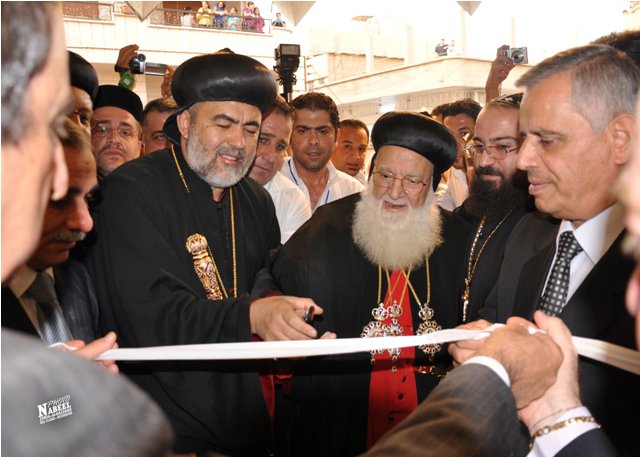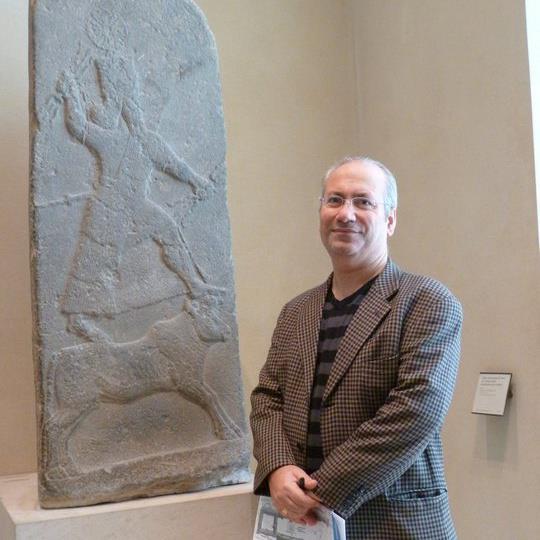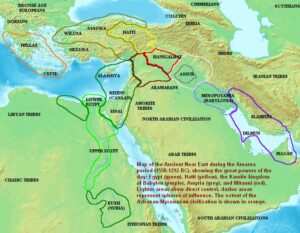٢٩ تموز يوليو عيد القديسة مرتا

كتب سريانية منوعة
5.Syrische Grammatik mit Ubungsbuch 492.35-19 قواعد اللغة السريانية الصرف mshablono اطلس الكتاب المقدس وتاريخ المسيحية 0000 الأكادية في الآرامية النحو عند السريان_compressed (1) النصوص والصرف تاريخ-الادب-السرياني تعلم السريانية برصوم ايوب تعلم السريانية بلا معلم تعلم اللهجة الغربية عبارات أدبية قصة حياة القديس مار يوحنا ذهبي الفم قواعد عبد المسيح قره باشي قواعد اللغة السريانية للخوري نعمت كتاب 2 صغار كتاب الاطفال الأول كتاب سولوقو كامل – كتاب-علوم-سرياني1 لمحة عن المدرسة 2021 ܝܪ̈ܩܘܢܐ ܡܕܪ̈ܫܢܐ ܒܩܢܘܢ̈ܐ ܕܠܫܢܐ-V_2

قصة قصيرة عفوية بلا رتوش بعنوان (لغز الطاولة المستديرة رقم 6)
لغز الطاولة المستديرة رقم 6
في مطعم ككل المطاعم تسير الأمور كل يوم بأعتياد ولن تجد أي أختلاف عن غيره
لكن هناك فرق واحد حيث كل الطاولات فيه مربعة ومستطيلة بأستثناء واحدة دائرية
وتحمل رقم 6 ويحيطها 6 كراسي تحتل مكاناً مميزاً في المطعم للحقيقة تلفت أنتباه
كل من يدخل للمطعم وترتاعه الحيرة من وجودها الغير منسجم مع ديكور المطعم
ولكن لم يتجرأ أحد أو لم يرغب في معرفة السبب لأن هذا أمر شخصي و يعود لمالك
المطعم وليس الاغتراب في شكلها لكن هو لا يسمح لأحد أن يستخدمها طوال يوم
السبت وتكون محجوزة طوال اليوم والكراسي نائمة على حرف الطاولة تنتظر
أصحابها لتعيدها معتدلة كباقي الكراسي وعلى الطاولة الصحون والأكواب موضعة
متأهبة لتخدم ضيوفها والشمعة في وسطهم تشعل من الساعة السادسة مساء لمنتصف
الليل وفي اليوم التالي تعود ألأمور لحالها ويسمح للرواد باستخدامها مثل بقية
الطاولات واستمر الحال هكذا لشهور وسنوات ولا أحد يعرف السر في كل هذا.



تحرير /عنكاوا كوم عن نيوز ويك
ترجمة \ريفان الحكيم
سعى الكتاب ان تكون مدوناتهم ذات مدى محدود دون ان تكون الرغبة بان تحظى تلك الافكار التي نقلوها سواء على المستقبلات المتاحة لاسيما جلد الحيوانات مناسبة لان تصل للاجيال اللاحقة لذلك بقيت بعض تلك النصوص مخبوءة امام اعيننا لرغبة تلك الشريحة من الكتاب ان يقوموا بمسح ما دونوه لغرض كتابة نص اخر على ما كان متاحا امامهم ورغم ذلك فقد دخلت التقنية الحديثة هذا المجال لغرض استعادة النصوص السرية كما داب العلماء في مختبر الولايات المتحدة للطاقة في ولاية كاليفورنيا ليجروا ابحاثا مكثفة شهدها ( ستانفورد ساينكروترون للاضاءة (SSRL) ) حيث بدا فريق الابحاث جهوده بتحليل صفحة لم تكن مسبقا قابلة للقراءة كجزء من المقدمة.



الآثار التاريخية للثقافة السريانية، والتي لديها بنية فريدة من نوعها في مجالات الفن، والحِرف، والهندسة المعمارية، والفنون الشعبية والاقتصاد؛ من الممكن رؤيتها في مناطق مثل أنطاكيا وإسكندرون وأضنة وملاطية وأورفة وإيلازيغ وأديامان وديار بكر وماردين وفان وباتمان وهكاري وسيرت وشرناق (في نواحي تركيا).وفي بلاد الشام وبلاد الرافدين. تحتوي الثقافة السريانية العادات والطقوس التي تتمحور حول الإنسان والتي تطورت بناءً على هذه الثقافة سمات فولكلورية غنية. من خلال هذا البناء، ساهمت دائمًا في التنمية الاجتماعية والثقافية للمنطقة.

Syriac Culture and Its Future Perspective
The historical traces of Syriac culture and its unique structure in the realm of art, crafts, architecture, folklore, economy can be seen in different regions of Turkey such as Antakya, İskenderun, Adana, Malatya, Urfa, Elazığ, Adıyaman, Diyarbakır, Mardin, Van, Batman, Hakkari, Siirt and Şırnak. Syriac culture and the people-centered customs, conventions and rituals that developed within it contain rich folkloric attributes. With this structure, it has always contributed to the sociocultural development of the region.
Shaped by the input of Ancient Mesopotamian culture, Syriac culture has gone through a transformation unique in form and content by passing through a new melting pot of understanding as a result of the fermentation of elements taking shape in tandem with the birth of Christianity. Thus, the main source of reference has evolved into a feeling and sensitivity for the Word of the Lord and moral norms. By historically experiencing and comprehending the truth that, “Humans are human when they act righteously toward God and truth, and morally toward creation,” the masters of pen and word of this culture have left us a rich literature and unlimited inheritance, and with spiritual awareness, they have served the development of social thought.
In this context, famous social scientist Malfono Yuhanun Bar Adi (893-974), who considered a life lived in ignorance wasted and continually searched the sciences for immortality is only one of these historical masters and personalities. Malfono Yuhanun Bar Adi suggests that people develop a rational style within the frame of individual wholeness which forms the basis of public morality. In this context, he says, “With intelligence and wisdom, people must incrementally avoid their bad habits, master their desires and carnal cravings, and try to reach the highest level. In order to do this, they must learn the rules and policy of ethics and morals, and try to form relationships with the wise.”
In expressing that people can find goodness depending on the decisions and choices they make, he says, “Humanity must make an ethical rule of continually reading books written on the subject of morality. Humans must analyze works penned on the subject of morality, the politics of morality, and behavior. They must use the things prescribed by elevated figures, and apply what has been deemed worthy of application by the ancient wise ones. They must learn at least a little of the art of writing and critical thinking, they must equip themselves with grace and eloquence, and finally they must continually raise prudent and respectable individuals by staying in touch with scholarly and wise people.”
As one can gather from the prescriptions of Malfono Yuhanun Bar Adi, who was raised in the Syriac tradition, Syriac culture, with its unique and important past in the broader history of civilization and humanity has an outreaching character in the social, religious, economical sociocultural life of the region. Throughout history, Syriac has served as a major bridge in intercultural interaction. This culture has contributed to the development of East-West thought, civilization, philosophy and moralism. This breakthrough in the realm of thought has reached the Arab world as well as Europe. Its role and impact on transfer of antiquity to the Islamic world is undeniable. It gains prominence with its important contributions primarily to the Arabic language and Islamic philosophy. As an autochthonous culture of our geography, it has strived to continually contribute to common life with an understanding that sees responsibility as a virtue. By aspiring to live and let live, it has always prioritized active altruism, social peace, and solidarity. It has encouraged a culture of coexistence, cooperation, peace, prosperity, and stability. Because this culture is not just a remnant of the past, it is also the inheritor of the values that add different meanings to the pluralistic identity of the region. With its existing churches and monasteries, with its centers of science and knowledge, it still makes important contributions to economic development and national and global recognition of the region. However, though this is the situation regarding this rich cultural heritage, it has also been dragged into a subaltern position that unfortunately breeds apathy. Despite all of its positive roles in history, though it was one of the fruitful vessels that sustained Eastern culture, through historical events, sociopolitical conflicts it has shriveled and dwindled into a well in need of support and care. Actually, this passive and sterile situation is the kaleidoscopic continuation of older periods, historical changes and event. Although the continuation and protection of this culture, which is a part of Turkey and the universal heritage of worldwide scope, depends on many components, the priority is its further recognition, comprehension and adoption in its own native land. And this is only possible by creating awareness of new concepts that will expand social perception. To quote a wise saying, “Awareness is the mother of orphan knowledge.”[1]
In other words, the main purpose here should be to sustain and strengthen this ancient culture which carries over the spirit of Ancient Mesopotamia with its lost and veiled elements. There is a need for different efforts so that this spirit is not extinguished. Protecting, adopting, and passing on this culture to future generations should not just be the responsibility of those who bear it and love it. Every individual who bears responsibility towards humanity and universal culture should be sensitive to the matter of its preservation. The comprehension of the spirit carried by this ancient culture in the historical background is directly proportional to its being uniquely recognized, known and adopted. Therefore, the sensitivity displayed and scientific studies performed by the local governments and universities in this culture’s land of origin will fulfil the function of watering a withering tree, so to speak. Therefore, the existence and future perspective of this ancient culture should advance in parallel with the new alternatives that will be developed with human touches and positive approaches that spring from affectionate awareness. If the current situation is cured through sociocultural and scientific methods, not only will the evident apathy and passivity evolve into a positive course of events, it will also turn into a daily growing interest. It is certain that this situation will contribute to the cultural interaction of the pluralistic makeup of the region.
Under present conditions, since gaining a strong foothold in the global climate starts with the local and with differences, the meaning that this strengthening will carry for the region and country is self-evident. Because when it comes to Syriac culture, the Mardin region is pretty much like a social laboratory. In this geography, Syriac is still used as the language of both the church and the people. It is obvious that appreciating and supporting this globally compelling value with concrete efforts will uniquely contribute to the socioeconomic, sociopolitical and sociocultural processes of the region.
On the other hand, the bearers of the light of knowledge also have responsibilities towards life and humanity. Under our present-day conditions where means and end are often confused, the greatest good one can pass on to the future is contributing to people’s development and transformation. And the method of doing this no doubt lies in cultural and scientific studies.
In the context of unity in production and contribution to activities, it can be said that, “If someone throws manure at you, cast some seeds on it.”
Success must be the only option. Only with this belief can we reach the sincerity of our spirit. When the good seeds cast into the future, though lacking, are sincere, they are certain to have an impact. Because every contribution made with sincere effort towards the benefit of the culture will come back with its blessing. By contributing to cultural and scientific studies, people benefit themselves before they do others. Taking goodness by the hand means positive energy and power. If goodness does not get up, the march cannot continue. As a result of the latest scientific studies, it has been recognized that even a small favor brings a certain peace and joy to the person’s heart, and leaves positive impressions both on the person doing the favor and the one receiving it.
Do not forget that all cultures speak of the mystery of humanity. However, people who do not return to their source and essence are doomed to being destroyed. No society can survive for long with a way of thinking that does not originate from its own essential culture. Only if every society develops a way of thinking that derives from its own essential culture and interacts with the universal, will social cohesion and social peace find meaning. This way of thinking must develop into a form of contact that serves social justice, peace, equity, mutual nourishment, and coexistence rather than asserting one’s own dominance or destroying others. For everything in the universe is useful as long as it furthers the understanding of the meaning of life.
Striving to preserve an ancient spirit like the Syriac culture, nourishing the courage of those who labor for this cause will be an important and meaningful contribution on behalf of future generations. Because the spirit cannot survive without its hope. A tree only survives by its roots. If the roots dry up, the entire trunk will suffer. In that case, the roots must be watered; they must not be abandoned to hopelessness in a way that will conduce to positive motivation. Literature should be prioritized and supported with new contributions. Because in the civilized world or in the developed societies which have grasped the meaning of life, it is one of the basic indicators of the lust for life. In that case, cultivating every new seed cast into the field of culture, which is also recognized as a rational capital asset, and nurturing said seed at various stages must be a basic responsibility, and all efforts pertaining to this must be indiscriminately supported.
Yusuf Beğtaş
Syriac Language-Culture and Literature Association / Mardin
[1] In Syriac literature, existing but undiscovered knowledge is called “orphan knowledge.” The moment we discover any new knowledge and begin applying it, it is no longer orphan knowledge for us. Therefore, discovering is more important than knowing. If a person is unaware that they know, that knowledge is useless.

الثقافة السريانية والنظرة المستقبلية
الآثار التاريخية للثقافة السريانية، والتي لديها بنية فريدة من نوعها في مجالات الفن، والحِرف، والهندسة المعمارية، والفنون الشعبية والاقتصاد؛ من الممكن رؤيتها في مناطق مثل أنطاكيا وإسكندرون وأضنة وملاطية وأورفة وإيلازيغ وأديامان وديار بكر وماردين وفان وباتمان وهكاري وسيرت وشرناق (في نواحي تركيا). تحتوي الثقافة السريانية العادات والطقوس التي تتمحور حول الإنسان والتي تطورت بناءً على هذه الثقافة سمات فولكلورية غنية. من خلال هذا البناء، ساهمت دائمًا في التنمية الاجتماعية والثقافية للمنطقة.
شهدت الثقافة السريانية، التي تشكلت ببيانات ثقافة بلاد ما بين النهرين القديمة، تغيرًا فريدًا من حيث الشكل والمحتوى، مروراً ببوتقة تفاهم جديد نتيجة تخمر العناصرالتي تطورت مع ولادة المسيحية. وهكذا تطورت إلى شعور وحساسية تجاه كلمة الرب والمعاييرالأخلاقية كمصدرأساسي للمرجعية. في العملية التاريخية، ترك لنا أدباء وأسياد الكلام في هذه الثقافة، الذين اختبروا واستوعبوا حقيقة أن “الإنسان يصبح إنسانًا عندما يعامل الحقيقة بطريقة حقّة ويعامل الكائنات بطريقة أخلاقية”، تركوا لنا أدبًا غنيًا وإرثًا غيرمحدود، وخدموا تنمية الفكرالاجتماعي بالوعي الروحي . في هذا السياق، فإن عالم الاجتماع الشهير يوحانون بار آدي (893-974)، المولود في بغداد، والذي كافح الجهل في الحياة وبحث باستمرار عن العلم من أجل الخلود، هو أحد هؤلاء الخبراء والشخصيات التاريخية.
ينصح الأستاذ يوحانون بار آدي الناس بتطويرأسلوب عقلاني في إطارالنزاهة الفردية، والتي تشكل أساس الأخلاق العامة.
في هذا السياق يقول: “يجب على الإنسان أن يتجنب عاداته السيئة تدريجياً بالعلم والعقل، وأن يتحكم في شهواته ورغباته، ويحاول الوصول إلى أعلى المستويات. لهذا، يجب أن يتعلم أصول القواعد الأخلاقية وسياستها ويحاول إقامة صلات مع العلماء. بينما يعبر عن أن الشخص يمكن أن يحقق الخير اعتمادًا على الاختيارات والتفضيلات التي سيتخذها في نفس الموضوع. يجب على الإنسان أن يجعل قراءة الكتب عن الأخلاق قاعدة أخلاقية دائمة لنفسه. يجب أن يفحص الأعمال المكتوبة حول الأخلاق والسياسة والسلوك الأخلاقي. يجب أن يطبق ما أمرت به الشخصيات المعتبرة، وأن يطبق ما قاله الحكماء القدامى والقيام به. يجب أن يكتسب فن الكتابة والشروحات التوضيحية، وإن كان بشكل قليلً، وأن يجهز نفسه بالنعمة والخطابة، وأخيراً، بالتواصل مع العلماء والحكماء، يجب عليه دائمًا تربية أفراد حكيمين ومحترمين.”
الذي يمكن استخلاصه من أوامر الأستاذ يوحانون بار آدي، الذي نشأ على التقليد السرياني، فإن الثقافة السريانية، التي لها تاريخ فريد ومهم في تاريخ الحضارة والإنسانية، لها صفة سبّاقة في المجال الاجتماعي والديني، والحياة الاقتصادية والاجتماعية والثقافية للمنطقة. على مر التاريخ، كانت بمثابة جسر مهم في التفاعل بين الثقافات.
ساهمت هذه الثقافة في تطويرالفكر والحضارة والفلسفة والعقلانية بين الشرق والغرب. ووصل هذا الاختراق التي فتحته في عالم الفكر إلى العالم العربي وأوروبا. وتمثل في نقل الفلسفات القديمة إلى العالم الإسلامي، فإن دور هذه الثقافة وتأثيرها الذي لا يمكن إنكاره موضع تساؤل. وتميزت بإسهاماتها الهامة في الفلسفة العربية والإسلامية. باعتبارها ثقافة أصلية في جغرافيتنا، فقد كانت في محاولة دائمة للمساهمة في الحياة المشتركة بروح المسؤولية والفضيلة. وبهدف العيش والسماح بالعيش، فقد أعطت الأولوية دائمًا للإيثار النشط والسلام الاجتماعي والتضامن. لقد عززت ثقافة العيش المشترك والتعاون والسلام والازدهار والاستقرار. لأن هذه الثقافة ليست من تراث الماضي فحسب، بل هي وريث قيم تضيف معاني مختلفة للهوية التعددية للمنطقة. مع الكنائس والأديرة التاريخية الموجودة، ومراكز العلوم والحكمة، لا تزال تقدم مساهمات كبيرة في التنمية الاقتصادية للمنطقة والاعتراف بها على المستوى الوطني والعالمي. ومع ذلك، على الرغم من أن هذا هو الحال فيما يتعلق بهذا التراث الثقافي الغني، إلا أنه للأسف تم جره إلى التبعية التي تغذي اللامبالاة. على الرغم من كل أدوارها الإيجابية في التاريخ . إنها من الأوردة المنتجة التي تغذي الثقافة الشرقية، ولكن بسبب الأحداث التاريخية والصراعات الاجتماعية والسياسية، تحولت إلى ينبوع بحاجة إلى الرعاية والدعم. في الواقع، هذا الوضع السلبي والعقيم هو استمرار للفترات القديمة والتغيرات والأحداث التاريخية في نغمات مختلفة. على الرغم من أن استمرارية وحماية هذه الثقافة، التي هي جزء من التراث التركي والعالمي، تعتمد على العديد من المكونات، إلا أن الأولوية هي أن يتم الاعتراف بها وفهمها واحتضانها بشكل أكبر في وطنها. هذا ممكن فقط من خلال خلق وعي جديد يساهم في الإدراك الاجتماعي. كما يقول المثل المقتضب ، “الوعي هو أم المعرفة اليتيمة [1]“..
لذلك، يجب أن يكون الهدف الرئيسي هنا هو تغذية وتقوية هذه الثقافة القديمة التي تحمل روح بلاد ما بين النهرين القديمة بعناصرها الضائعة والضمنية. هناك حاجة إلى جهود مختلفة للحفاظ على هذه الروح حية. لا ينبغي أن يكون الحفاظ على هذه الثقافة وامتلاكها ونقلها إلى المستقبل مسؤولية من يحملها ويحبها فقط. يجب أن يكون كل فرد مسؤول عن الإنسانية والثقافة العالمية حساسًا لبقاء هذه الثقافة.
لأن فهم روح هذه الثقافة القديمة في الخلفية التاريخية يتناسب طرديًا مع الاعتراف الحقيقي بفردانيتها وأصالتها. لذلك، فإن الأبحاث والدراسات العلمية للحكومات المحلية والجامعات في الأراضي التي ولدت فيها هذه الثقافة ستؤدي تقريبًا وظيفة سقي شجرة جافة بالماء. لهذا السبب، يجب أن يتوازى وجود هذه الثقافة القديمة ومنظورها المستقبلي مع بدائل جديدة يتم تطويرها بمقاربات إيجابية ولمسات إنسانية مستمدة من الوعي الوجداني.
وبما أن طريقة الحصول على مكانة قوية في العملية العالمية في ظروف اليوم تبدأ من المحلية والاختلافات، فإن معنى هذا التعزيز بالنسبة للمنطقة والبلد لا يحتاج حتى إلى شرح لأن منطقة ماردين تكاد تكون بمثابة مختبراجتماعي للثقافة السريانية. لا تزال اللغة السريانية مستخدمة في هذه الجغرافيا كلغة كنسية ولغة شعبية. من الواضح أنه إذا تم دعم هذه القيمة، التي تجذب الانتباه في جميع أنحاء العالم، بجهود ملموسة، فإنها ستقدم مساهمة مختلفة في الحركة الاجتماعية والاقتصادية والاجتماعية والسياسية والاجتماعية والثقافية في المنطقة.
من ناحية أخرى، يتحمل أولئك الذين يحملون نور المعرفة مسؤوليات تجاه الحياة والإنسانية. في ظروف اليوم، حيث تختلط الأهداف والوسائل، فإن أعظم فائدة يمكن تحقيقها للمستقبل هو المساهمة في تنمية الناس وتغييرهم. الطريق إلى ذلك بلا شك من خلال الدراسات الثقافية والعلمية.
ويقال في سياق الاندماج في الإنتاج والمساهمة في خلقه؛ “إذا قام شخص ما بإلقاء السماد عليك، فقم بزرع البذور على هذا السماد”.
يجب أن يكون النجاح هو السبيل الوحيد. فقط بهذا الإيمان يمكننا بلوغ صدق روحنا. لا ينبغي لأحد أن يشك في أن بذور الخير المزروعة في المستقبل، حتى لو كانت غير كاملة، سيكون لها أثرعندما تكون صادقة. لأن كل مساهمة من أجل المنفعة الثقافية بجهود مخلصة ستعود بالوفرة. من خلال المساهمة في الدراسات الثقافية والعلمية، يقدم الشخص خدمة لنفسه في المقام الأول، وليس لشخص آخر. إن مصافحة يد الخير تعني الطاقة الإيجابية والقوة. إذا لم يقف الخيرعلى رجليه فلن تستمر المسيرة. كنتيجة لأحدث الأبحاث العلمية ، فقد تم قبول أنه حتى تقديم خدمة صغيرة يجلب الفرح والسلام لقلب المرء وله آثار إيجابية على كل من الفاعل والشخص الذي يرى الخير.
لا ينبغي أن ننسى أن كل الثقافات تحكي سر الإنسانية. ومع ذلك، فإن الشخص الذي لا يعود إلى أصله وجوهره محكوم عليه أيضًا بالهلاك. لا يمكن لأي مجتمع أن يعيش لفترة طويلة بطريقة تفكيرلا تنتمي لنفسها ولا تأتي من ثقافتها الخاصة. لا يمكن للوئام الاجتماعي والسلام الاجتماعي أن يجدا معنى إلا إذا تمكن كل مجتمع من تطوير فكرة قائمة على ثقافته الخاصة في مقابل العالمية. يجب أن تتطور طريقة التفكير هذه كشكل من أشكال الاتصال الذي يخدم العدالة الاجتماعية والسلام والإنصاف والمنفعة المتبادلة والإبداع، بدلاً من ترسيخ هيمنتها وتدميرالآخرين. لأن كل شيء في الكون مفيد طالما أنه يدعم فهم معنى الحياة.
إن محاولة الحفاظ على روح قديمة مثل الثقافة السريانية حية هي من خلال رعاية وشجاعة أولئك الذين يناضلون من أجل هذه القضية وستكون مساهمة مهمة وذات مغزى للأجيال القادمة. لأن الروح لا تستطيع الاستغناء عن الأفق. تعيش الشجرة فقط من جذورها. إذا جفت الجذور، فسوف يتضرر الساق بالكامل. في هذه الحالة، يجب أن تُروى الجذور ولا ينبغي تركها لليأس وتشجيعها بطريقة تؤدي إلى دافع إيجابي.
يجب إعطاء الأولوية للأدب / الكتابات ودعمها بمساهمات جديدة. لأنه في العالم المتحضر أو في المجتمعات المتقدمة التي تفهم معنى الحياة، تعد الثقافة أحد المؤشرات الرئيسية للالتزام بالحياة. لذلك، يجب أن تكون المسؤولية الرئيسية هي زراعة كل بذرة جديدة تُزرع في مجال الاستزراع، والتي يتم قبولها أيضًا كقوة رأسمال عقلاني، وإطعام تلك البذرة في مراحل مختلفة، ويجب تقديم جميع أنواع الدعم للجهود المبذولة في هذا الاتجاه.
ملفونو يوسف بكداش
رئيس جمعية اللغة والثقافة والآداب السريانية / ماردين
[1] في الأدب بشكل عام، المعرفة المتوفرة والتي لم يتم التعرف عليها بعد تسمى “المعرفة اليتيمة”. بمجرد أن نلاحظ أي معلومات ونستخدمها، لم تعد تلك المعلومات معلومات يتيمة بالنسبة لنا. لذا فالشيء الرئيسي ليس أن تعرف ، بل أن تلاحظ. لأنه إذا لم يكن الشخص على علم بما يعرفه، فلا فائدة من هذه المعرفة.